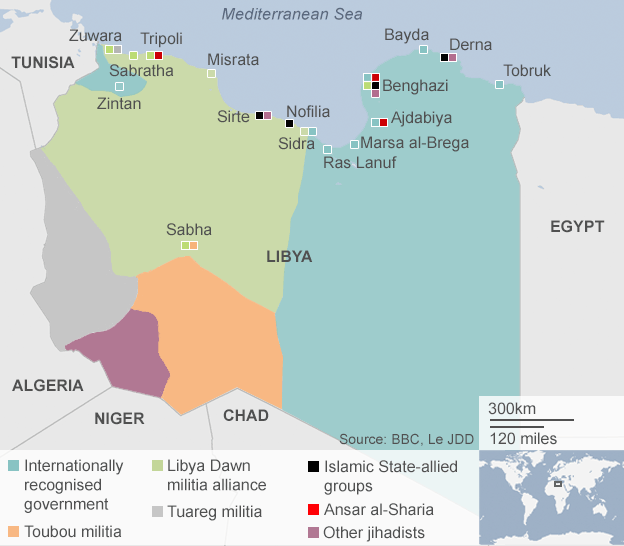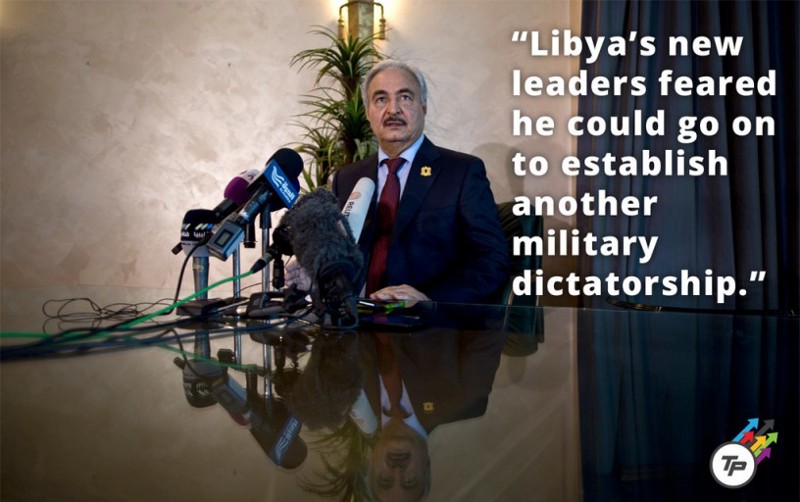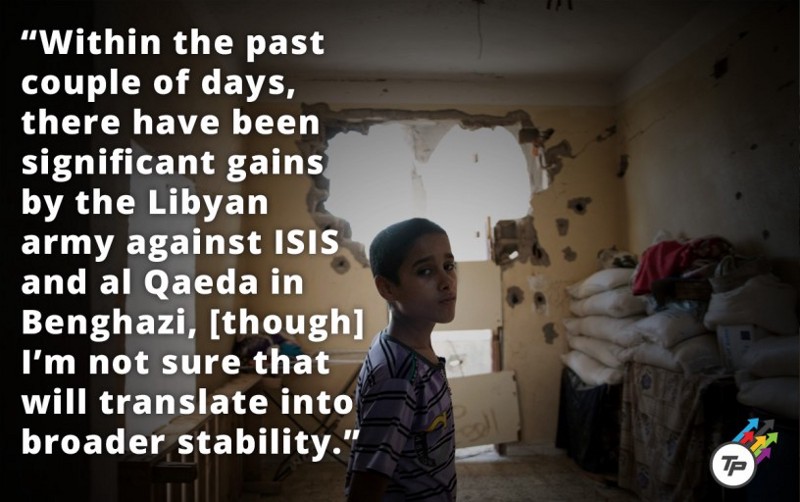Five years after the Libyan Revolution toppled longtime autocrat Muammar Qaddafi, the North African country is without a central government and witnessing the expansion of ISIS inside its borders.
If you’re not sure what exactly is happening in Libya — or why everyone keeps mentioning Benghazi in the U.S. presidential campaign — we have you covered.
Here’s a quick breakdown of all that you need to know about Libya:
What’s happening?
First, let’s rewind five years. On February 15, 2011, protesters gathered in Benghazi, the second largest city in the country, to protest the Libyan government’s arrest of human rights lawyer Fethi Tarbel. Demonstrations in Tunisia and Egypt gave Libyans hope for change. But government forces responded with rubber bullets and water cannons, and after protests only grew, authorities turned to lethal force. Demonstrators picked up arms from government arms depots, and a number of military officials defected. Soon, Libya was embroiled in a civil war, with the Libyan air force bombarding the rebels.
American and European forces got involved in March that year and disabled Libya’s air force. NATO took control of military operations later that month and set the stage for the rebels to push back against Qaddafi’s forces. In August, the rebels took over the capital city of Tripoli and captured Qaddafi’s headquarters, but the country’s longtime leader’s whereabouts were still unknown. Finally, on October 20, Qaddafi was found and killed by rebel fighters in his hometown Sirte.
In June 2014, Libya held parliamentary elections with liberal and nationalist politicians winning the majority of seats. Voter turnout was remarkably low due to the threat of violence. Clashes broke out soon after, as Islamist militias conducted a coup d’etat in Tripoli in support of the parties that lost in the elections.
Since then, Libya has operated without a central government. Instead, the country has two rival governments and a rapidly-increasing ISIS presence. Meanwhile, the south has witnessed clashes between the Tuareg and Toubou tribes, resulting in heavy casualties.

Who are the key players?
Libyan National Army
General Khalifa Haftar’s Libyan National Army controls much of Libya’s east, some of the south, and the mountainous town Zintan, near the western border with Tunisia. Haftar is anti-Islamist and a former member of the Libyan Army, but defected to the United States in 1990 where he became an American citizen. He returned to Libya in 2011 to aid the revolution. Some hail Haftar as the solution to Libya’s crisis, but the 73-year-old failed to gain universal trust of Libyans and the international community.

“Libya’s new leaders feared he could go on to establish another military dictatorship,” AFP reported last month. “His army has also been accused by the United Nations in the past of deliberately trying to sabotage peace talks with its air strikes on militia fighters.”
New General National Congress
Tripoli and a large part of western Libya is currently controlled by the New General National Congress. This government is buttressed by Libya Dawn, or Fajr Libya, the collective of Islamist militias that took over Tripoli by force after elections in 2014.
ISIS
Qaddafi’s hometown of Sirte, meanwhile, is under ISIS’ reign. Even though the group is being beaten back in Derna, ISIS’ Libyan branch is growing at a rapid rate, attracting not only Libyans but an increasing number of Europeans and Africans.
“Senegalese authorities recently reported that 30 men had gone to Libya to fight with the Islamic State there, trends that officials in Niger, Nigeria and Mali have also noticed,” the New York Times reported Monday.
Why should you care?
Every presidential candidate has discussed America’s role in fighting ISIS, and countering the group’s presence in Libya is likely to be high on the next U.S. president’s list of foreign policy priorities.
Last Friday, the United States bombed an ISIS militant base in the Libyan coastal town Sabratha, about 40 miles west of Tripoli. The strike killed 49 people — including a Tunisian ISIS leader and two Serbian embassy workers who were kidnapped by the group.
The airstrike “demonstrates how far we will go after [ISIS] leaders wherever they operate,” the Pentagon’s press secretary said in a statement after the attack. Nonetheless, the Obama administration has also come under criticism for not committing elite ground troops and conducting even more airstrikes.
As the United States continues to fight back against the ISIS, Libya will be a main point of discussion. “Libya is now home to the second-largest and fastest-growing Islamic State group affiliate outside Iraq and Syria,” Christoper S. Chivvis, the associate director of the International Security and Defense Policy Center at RAND Corporation, wrote in USA Today last week.
U.S. Ambassador J. Christopher Stevens was also killed in Benghazi on September 11, 2012. A House Select Committee investigation into what happened that day is ongoing — something Democratic candidate Hillary Clinton, who was Secretary of State during that time, has come under close scrutiny for.
What the experts say:
Daveed Gartenstein-Ross
Senior fellow at the Foundation for Defense of Democracies and CEO of Valens Global, a private counter terrorism consultancy, speaking to ThinkProgress:
“You have a fair amount of jihadist training camps in the southern part of the country including ISIS and al Qaeda that’s going to spill over into neighboring countries. Both attacks on tourists in Tunisia [in 2015] had attackers trained in Libya.”
“The Tunisian state is really dependent on tourism, and devastating attacks against tourist targets threaten to send the economy into a tailspin, which can further provide recruits and wind in the sails of militant organizations. Beyond that, Libya is one of major routes through which migrants travel to Europe. It’s called the central Mediterranean route, and one can see clearly [as] the civil war escalated just how frequently this route was used.”
The UN has been trying to broker an agreement between warring parties to reach a sort of unity government. Within the past couple of days, there have been significant gains by the Libyan army against ISIS and al Qaeda in Benghazi, [though] I’m not sure that will translate into broader stability.”

Dr HA Hellyer
Associate fellow at the Royal United Services Institute and a non-resident senior fellow at the Rafik Hariri Centre for the Middle East at the Atlantic Council, writing in the National last week:
“When it comes to [ISIS], Libya was underestimated for a long time. That was a mistake. [ISIS] sees the country as a natural next launching pad — and this extremist organisation cannot be allowed to scavenge Libya for its own nefarious designs.” “Nor can dissent within the country be interpreted solely through the lens of counter-terrorism, as though all of the people on one side are fighting terrorism and all those on the other be described as terrorists. The splits among Libyans cannot be permitted to be instrumentalised externally for partisan gains — that only leads to more conflict and strife for every Libyan.”
“The weight of regional forces and international powers should be used for only two things: to bring Libyans together to build their country together on a solid footing, and to ensure [ISIS] is dealt a crippling blow. Not so that [ISIS] is contained, but so that it is removed from the lives of Libyans.”
What Libyans say:
“I am a huge supporter of the revolution,” Nadia A. Ramadan, 25, told Middle East Monitor last week, “but I just think this year shouldn’t be the time for celebration.”

“Do I celebrate the fact that I can’t finish my education because of the black market exchange rate?” Khadija Hussein, a native of Tripoli, told MEM. “Do I celebrate the fact that I can’t withdraw money from the bank this past week because it doesn’t have any money? Or that I’m too scared to drive my own car around Tripoli so I ended up selling it? Can I celebrate the fact that my neighbours took out their AK47s during a small argument about cars parked on the street?”
—
“If we unify ourselves and create a neutral national army, we could easily destroy IS [another name for ISIS] in Libya,” Mustafa al-Sagezli, general manager of the The Libyan Programme for Reintegration & Development, an organization that helps reintegrate militiamen back into society, told Middle East Eye. “Without unity, [Western] air strikes will only further radicalize the population.”
This is the first of a series of explainer pieces, where we will cover under-reported countries and the internal conflicts that trouble them.
